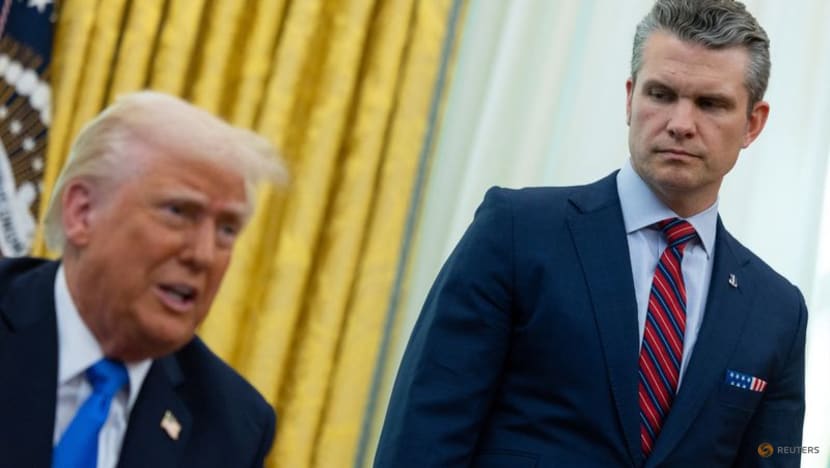Commentary: US defence chief’s Asia tour won’t fix American credibility crisis
US Defense Secretary Pete Hegseth can choose to uphold Washington’s commitment to the Indo-Pacific or let China play a more important role, says Karishma Vaswani for Bloomberg Opinion.

US Defense Secretary Pete Hegseth stands by US President Donald Trump, in the Oval Office at the White House, Washington, DC, Mar 21, 2025. (REUTERS/Carlos Barria/File Photo)
SINGAPORE: The battle of Iwo Jima in World War II was one of the bloodiest in the history of the US Marine Corps. Nearly 7,000 American soldiers died. On the Japanese side, the scale of the casualties was exponentially higher. The epic military operation is a reminder of America’s commitment to the Indo-Pacific.
Eighty years later, Secretary of Defense Pete Hegseth has a chance to show that resolve again. The alternative is to accept that China will play a more important role in the region – and take the space as the US retreats.
The timing of Hegseth’s first Asian tour couldn’t be more awkward. President Donald Trump’s “America First” mantra is raising eyebrows, but so is his administration’s apparent incompetence.
The revelation that US plans to bomb Houthi targets in Yemen were accidentally exposed via a commercial messaging app is worrying for nations that have depended on Washington’s military assistance. Compounding that sense of unreliability: More Trump tariffs are expected next week and allies are likely to be included.
The White House is batting away criticism of the intelligence leak, but it raises serious questions. If the US can be so careless with its own military plans, how much should others rely on it?
MIXED MESSAGES FROM WASHINGTON
Hegseth’s itinerary includes visits to the Philippines and Japan. Both US treaty allies should use this opportunity to get firm answers on how much support they can count on, but also shore up their capabilities in the face of Washington’s unpredictability.
The China challenge is getting harder to manage. Manila and Tokyo both have overlapping maritime claims with Beijing in the South and East China seas. These are becoming more difficult to fight as the People’s Liberation Army expands its capabilities around the world, using the full force of its coast guard and advanced undersea cable-cutting technology to its advantage.
Also in the mix is Taiwan’s security, which is important for Japan because of its geographic proximity. President Joe Biden’s administration relied on a network of support among allies to keep countries safe and stand up to China. There’s no indication that will continue under Trump.
There have been some moments of clarity. The defence secretary has had conversations with some key Asian allies, including the Philippines and Thailand, affirming iron-clad support for Manila. Joint Indo-Pacific drills between Australia, India, Japan, South Korea and the US took place earlier this month, and are set to continue despite objections from China.
But some of the other signals from Washington aren’t as encouraging. Under Biden, the US pledged to ramp up its military presence in Japan with the creation of a joint force headquarters.
Those plans may be scrapped to save costs, according to NBC and other local media reports. Trump has questioned why American money is being used to help Japan and other Asian allies defend themselves. These mixed messages are unsettling for the region.
Meanwhile, Beijing continues to get more assertive. Activities by Chinese vessels near a set of uninhabited islands in the East China Sea – called the Senkaku in Japan and the Diaoyu in China – are "clearly escalating", Japanese Foreign Minister Takeshi Iwaya said on Monday (Mar 24).
The Philippine defence chief has called the superpower’s expansive claims in the South China Sea “the biggest fiction and lie” that no Southeast Asian country would accept, adding that President Xi Jinping’s aggressive policies have undermined international goodwill fostered by his predecessors.
CHINA LIKELY TOP OF THE AGENDA
Hegseth is due to meet his counterparts in Manila and Tokyo. No doubt China will be at the top of their agendas. The three defence secretaries should signal to Beijing that the US is firmly committed to a free and open Indo-Pacific – and it’s not just rhetoric.
Washington can do this by announcing expanded military exercises, like the annual US-Philippine Balikatan drills. They’ve been growing in size in recent years and both sides should indicate a firm desire for that to continue.
The Keen Sword war games between Tokyo and Washington are also a good way to show Beijing that the US presence in the region is here to stay.
Both Asian allies should also tout an increase in their defense budgets as evidence that they are serious about self-reliance, as Trump has insisted upon. Understanding the president’s transactional approach is key in this era, so they should also commit to buying more American weapons.
Manila has already expressed its intention to acquire the US Typhon missile system as part of a push to secure its maritime interests. Tokyo has quietly been buying American weapons, too. These initiatives should continue, despite criticism by Beijing that such moves are destabilising to Asia.
The last eight decades have seen US supremacy in the Indo-Pacific grow from strength to strength. For the most part, that’s kept Asia safe. To mark those ties, Hegseth is scheduled to visit Iwo Jima to attend a Japan-US joint memorial ceremony marking the 80th anniversary of the end of World War II.
Washington needs to decide whether it still wants to maintain its relevance in the region. American credibility and regional security hang in the balance.















